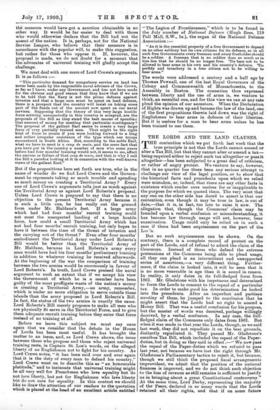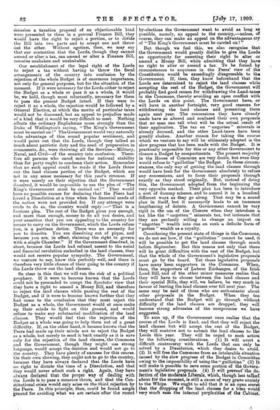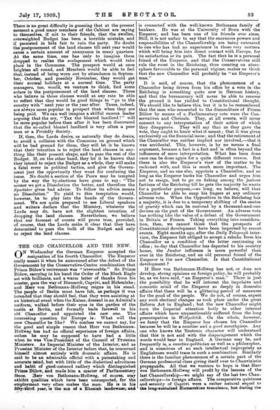THE LORDS AND THE LAND CLAUSES. T HE contention which we
put forth last week that the true principle is not that the Lords cannot amend or alter a Tax Bill, but that they cannot alter or amend a tax— being required either to reject such tax altogether or pass it altogether—has been subjected to a great deal of criticism, or rather of angry protest. We venture to say, however, that in'no quarter has there been any serious attempt to challenge our view of the legal position, or to show that the historical facts and precedents upon which we relied were mistaken, or, indeed, that there are any other facts in existence which render ours useless for or inapplicable to the purpose for which we quoted them. The very most that any one on the other side has dared to assert is that our contention, even though it may be true in law, is out of date,—that it is, in fact, too late to raise it now. The allegation that, though the Commons' claim may be founded upon a verbal confusion or misunderstanding, it has become law through usage will not, however, bear examination. Usage could only be relied on in such a case if there had been acquiescence on the part of the Lor But no such acquiescence can be shown. On the contrary, there is a complete record of protest on the part of the Lords, and of refusal to admit the claim of the Commons. Instead of those who defend the extreme pretensions of the Commons being able to plead usage, all they can plead is an intermittent and unsupported series of assertions,—a very different thing. Further- more, if the claim is looked into, it will be seen that it is no more venerable in age than it is sound in reason. In reality, it only dates in its full-fledged form from 1861. Mr. Gladstone with his impetuous zeal determined to force the Lords to consent to the repeal of a particular tax. In order to make good his determination he looked into the precedents. After an imperfect and partisan scrutiny of them, be jumped to the c,onclnsion that he might assert that the Lords had no right to amend a Money Bill. That was a useful conclusion for his purpose, but the master of words was deceived, perhaps willingly deceived, by a verbal confusion. In any case, the full- fledged claim of the Commons only dates from 1861. But when it was made in that year the Lords, though, as we said last week, they did not repudiate it on the best grounds, distinctly repudiated it. They passed Mr. Gladstoue's omnibus Tax Bill, which included the repeal of the Paper-. duties, but in doing so they said in effect :—" We now pass the repeal of the Paper-duties which we refused to pass last year, not because we have lost the right through Mr. Gladstone's Parliamentary tactics to rejed it, but because, though we still think the proposed fiscal arrangements improvident, we admit that the position of the national finances is improved, and we do not think such objection to the loss of revenue as still remains is sufficient to justify us in bringing about a great Constitutional controversy.' At the same time, Lord Derby, representing the majority of the 'Peers, declared in so many words that the Lords retained all their rights, and that if on some future Secasion a taxation proposal of an objectionable kind *ere presented to them in a general Finance Bill, they *otild have the right to reject a portion, or to divide the Bill into two parts and to accept one and throw out the other. 'Without egotism, then,. we may say that our contention that the Lords, though they cannot amend or alter a tax, can amend or alter a Finance Bill, remains unshaken and unshakable.
Our establishment of the . legal tight of the Lords to reject a tax without hating to throw the fiscal arrangements of the country. into confusion by the rejection of the whole Budget is of enormous importance, hot only for general purposes, but for the situation of the Moment. If it were necessary for the Lords either tó reject the Budget as a whole or pass it as a whole, it Would be, We hold, though most reluctantly, necessary for them to pats the present Budget intact. If they *ere to reject it as a whole, the rejection would be followed by a General Election, at which the merits of particular taxes Weald not be discussed, but an appeal to prejudice made of a kind that it would be Very difficult to meet. Nothing affects the ordinary Englislitnan more strongly than the Duke of Wellington's saying, "The King's Government must be carried on!" The Government would very naturally take advantage of this sound popular sentiment, and would point out that the Lords, though they talked so Much about patriotic duty and the need of preparation in firmaments, &c. were throwing all the Services—Military, Naval, and Civil—cif the country into confusion. There- fore all persons who cared more for national stability than for party ought to condemn their action. Remember that no such appeal could be made if the Lords threw out the land clauses portion of the Budget, which are not in any sense necessary for this year's revenue. If it were merely on their rejection that the Government dissolved, it would be impossible to use the plea of "The King's Government must be carried on !" They would have no possible excuse for declaring that the Peers had farced a. Dissolution at a time when the financial needs of the nation were not provided for. If any attempt were invle to do so, the country would reply :—" That i4 factious plea. The rest of the Budget gives. you enough, and more than enough, money to do all :tou desire, and your assertion that you are appealing to the country for means to carry on the Government, which the Lords refuse jou, it a partisan deice. There was no necessity for you to dissolve. You are dissolving out of pique, and beCatise you are, itt effect, claiming the right to govern 'with a single Chamber." If the Government dissolved, in short, because the Lords had refused assent to the social and financial revolution embodied in the land clauses, they would not receive popular sympathy. The Government, 'ire venture to say, know this perfectly well, and there is therefore very little chance of their going to the country if the Lord throw out the land clauses.
So clear is this that we will run the risk of a political prophecy. If it were to become known that the Lords could not be persuaded to accept the Specator view that they have a right to amend a Money Bill, and therefore to reject the land clauses while passing the rest of the Budget, and if it were to become known further that they had come to the conclusion that they must rejeet the Budget as a whole, the Government would at once make tip their minds to fight on this ground, and would refuse to 'make any substantial modification Of the land Clauses. They would feel that the rejection of the Budget as a whole was going to help them out of a great difficulty. If, on the other hand, it became known that the Peers had made up their minds not to reject the Budget as a, whole, but merely to send it back exactly as it is save onlv for the rejection of the land clauses, the Conitnotis and the Government, though they might use strong language, would accept the decision and would not go to the country. They have plenty of excuses for this course. On their own showing, they ought not to go to the cbutitry, because they have always declared that the Lords have no tight to dictate the time of a Dissolution, and that they would never admit such a right. Again, they haie always declared that the proper way Of dealing With the Lords Is to pass a, measure thrice, and that the Con- ititutiortai &Ws would only arise on the third rejection by the Peer. In this principle, then, could be found &triple gtOund for avoiditig *hat *6 are certain after' the recent by,electiont the Government want to avoid as long aal PoSsible, namely, in appeal to the conntry,--;-unless, Of course, they can make an appeal On the advantageous cry of "The King's Government must be carried oh ! But though we feel this, we also recognise that the Government would greatly dislike to give the Lords an opportunity for asserting their right to eater or amend. a Money Bill, while admitting that they have no right to alter or amend a tax. To be forced by circumstances to acquiesce in the Peers' vie* of the Cohittitution would be exceedingly disagreeable to the Government. If, then, they know beforehand that the Lords are determined to reject the land clauses while accepting the rest of the Budget, the Government will probably find good realm for Withdrawing the Land-taxes in the Commons, thereby avoiding an Open conflict with the Lords on this point. The Goternment have, of will have in another fortnight, very good reasons for withdrawing the land clauses and presenting them again next year. The concessions they, have already made have so altered and confused their own proposals that no man can tell what will be the actual result of their application. The tax on " uugotten " minerals is already doomed, and the other TAud,taxes have been greatly shaken. Another reaton for taking the course which we venture to say will be ultimately adopted is the slow progress that has been made with the Budget. It is practically impossible for this or any other Government to closure a Budget by compartments. The present majority in the House of Commons are Very docile; but even they would refuse to "guillotine" the Budget. In these circum- stances, the only way of getting the land clauses through would have been for the Government absolutely to refuse any concessions, and to force their proposals through exactly as they stood originally. But, instead of doing this, the Government adopted from the beginning the very opposite Method. Their plan has been to ittroduce a sort of dummy schelne, and to amend it in a hundred different ways as they go along. That may be a sound plait in itself, but it necessarily leads to an immense lengthening of debate. A GoVernment cannot be Very rigid in the uSe of the OldStire when they introduce a. tax like the " ungotteli minerals tax, but intimate that they are perfectly willing . to change an impost on " uftgotten ' Wealth into one on such a definite form Of " gotten " wealth as a royalty.
Considering ,the present state of things in the Commons, we do not see how, if the " guillotine " cannot be used, it will be possible to get the land clauses through much before September. But this means not only that there will be great difficulties with the rest of the Budget, but that the *laale of the Government's legislative proposals must go by the board. Yet those legislative proposals have many keen supporters in the Commons. When then, the supporters of Labour Exchanges, of the Irish Land Bill, and of the other minor measures realise that they will have to cheese between the land clauses , and their Special Bills, they Will, we believe, be very much in favour of Iciaiing the land clauses over till next year. the same may be said of those who are enthusiastic about other proposals iii the Budget. When they too understand that, the Budget will go through without difficulty if the land clauses are dropped, they will becothe strong advocates of the compromise we have suggested. To sum up, it the Government once realise that the course of the Lords is fixed, and that they will reject the land clauses but will accept the rest of the Budget, they will contrive not to Subtilit the laud clauses to. the Lords this year. They Will be Urged to Such action by the following considerations. (1) it Will avert it difficult controversy with the Lords that can Only be solved by a Dissolution, which they desire to avoid. (2) It will free the Commons from an intolerable situation caused by the slow progress Of the Budget in Committee owing to the impossibility of using the " (3) It will Make it possible to save seine portion Of the Godera- merit's legislative proposals. CO It will prevent the do. fection Of the toderate Liberals, Which, though leas talked abbut f6f the Moult:int, is still a &Luise of very grave anxiety to the Whips. We might to add that it is at open secret that the dropping of the land dallies for a tithe would Very niudif ease the Internet t)erpleiitiei cif the dabittet: There is no great difficulty in guessing that at the present moment a good many members of the Cabinet are saying to themselves, if not to their friends, that the swollen, overweighted Budget has been a horrible mistake, and if persisted in bids fair to ruin the party. No doubt the postponement of the laud clauses till next year would cause a certain amount of annoyance in many quarters. At the same time one has only to imagine them dropped to realise the soulagement which would take place in the Commons. The prospect would at once brighten all round, and Members would be able to feel that, instead of being worn out by atteudance in Septem- ber, October, and possibly November, they would get their normal holidays at a normal time. The party managers, too, would, we venture to think, find Rome solace in the postponement of the land clauses. Those whe believe in those clauses would at any rate be able to reflect that they would be good things to "go to the country with" next year or the year after. Taxes, indeed, are always more popular in prospect than when they are being paid. We can well imagine a skilful caucus leader arguing that the cry, "Tax the bloated landlord ! " will be more popular before than after it has beetr discovered that the so-called bloated landlord is very often a poor man or a Friendly Society.
If, then, the Lords desire, as naturally they do desire, to avoid a, collision with the Commons on ground which will be bad ground for them, they will let it be known that their intention is to reject the land clauses in any- thing like their present shape, and to pass the rest of the Budget. If, on the other hand, they let it be known that they intend to reject the Budget as a whole, they will make a fatal error in political tactics, and give the Govern- ment just the opportunity they want for confusing the issue. No doubt a. section of the Peers may be tempted b:v the way the by-elections have gone to say: "The sooner we get a Dissolution the better, and therefore the Spectator gives had advice. To follow its advice means no Dissolution." To yield to this temptation would, however, be to play into the hands of the Govern- ment. We are quite prepared to see Liberal speakers and writers declare that the Ministry, whatever the Lords may do, have not the slightest intention of dropping the land clauses. Nevertheless, we believe that our forecast of events will prove true, provided, of course, that the Lords make it clear that they have determined to pass the bulk of the Budget and only to reject the land clauses.










































 Previous page
Previous page